
Alexander Martin Clunes is an English actor, director and television presenter. He is best known for portraying Martin Ellingham in the ITV comedy-drama series Doc Martin and Gary Strang in Men Behaving Badly. Clunes has narrated a number of documentaries for ITV, the first of which was Islands of Britain in 2009. He has since presented a number of documentaries centred on animals. He has also voiced Kipper the Dog in the animated series Kipper.
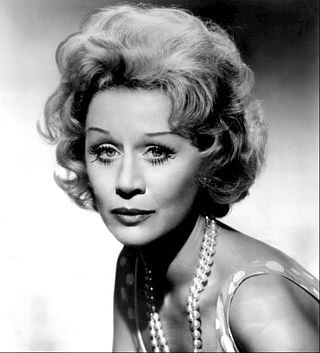
Margaret Leighton, CBE was an English actress, active on stage and television, and in film. Her film appearances included in Anthony Asquith's The Winslow Boy, Alfred Hitchcock's Under Capricorn, Powell and Pressburger's The Elusive Pimpernel, George More O'Ferrall's The Holly and the Ivy, Martin Ritt's The Sound and the Fury, John Guillermin's Waltz of the Toreadors, Franklin J. Schaffner's The Best Man, Tony Richardson's The Loved One, John Ford's 7 Women, and Joseph Losey's The Go-Between and Galileo. For The Go-Between, she won the BAFTA Award for Best Actress in a Supporting Role and was nominated for the Academy Award for Best Supporting Actress.
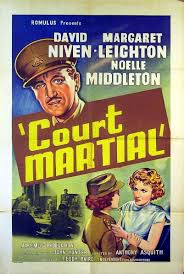
Carrington V.C., also known as Court Martial in the United States, is a 1954 British legal drama film directed by Anthony Asquith and starring David Niven, Margaret Leighton and Noelle Middleton. Others in the cast include Allan Cuthbertson, Victor Maddern, Raymond Francis, Michael Bates, Laurence Naismith, Geoffrey Keen and Maurice Denham. Made by Romulus Films it was distributed by the company's Independent Film Distributors and released in the United States by Kingsley-International Pictures. It was adapted for the screen by John Hunter from the play of the same name by Campbell and Dorothy Christie. It was produced by Teddy Baird.

Laurence Naismith was an English actor. He made numerous film and television appearances, including starring roles in the musical films Scrooge (1970) and the children's ghost film The Amazing Mr. Blunden (1972). He also had memorable roles as Captain Edward Smith of the RMS Titanic in A Night to Remember (1958), the First Sea Lord in Sink the Bismarck! (1960), and Argus in Jason and the Argonauts (1963).

Marius Re Goring, was an English stage and screen actor. He is best remembered for the four films he made with Powell & Pressburger, particularly as Conductor 71 in A Matter of Life and Death and as Julian Craster in The Red Shoes. He is also known for playing the title role in the long-running TV drama series, The Expert. He regularly performed French and German roles, and was frequently cast in the latter because of his name, coupled with his red-gold hair and blue eyes. However, in a 1965 interview, he explained that he was not of German descent, stating that "Goring is a completely English name."

William Maurice Denham OBE was an English character actor who appeared in over 100 films and television programmes in his long career.

Basil Dignam was an English character actor.
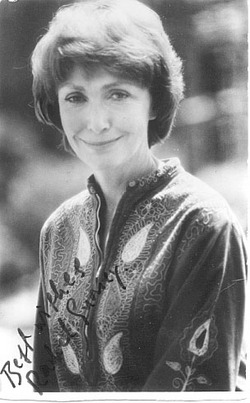
Rachel Gurney was an English actress. She began her career in the theatre towards the end of World War II and then expanded into television and film in the 1950s. She remained active, mostly in television and theatre work, into the early 1990s. She is best remembered for playing the elegant Lady Marjorie Bellamy in the ITV period drama Upstairs, Downstairs.

Lionel Alfred William Atwill was an English stage and screen actor. He began his acting career at the Garrick Theatre. After coming to the U.S., he subsequently appeared in various Broadway plays and Hollywood films. Some of his more significant roles were in Captain Blood (1935), Son of Frankenstein (1939) and To Be or Not to Be (1942).
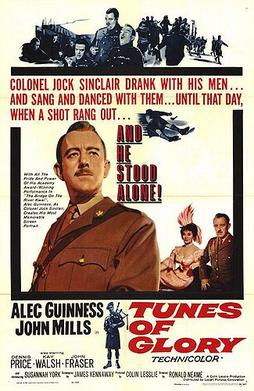
Tunes of Glory is a 1960 British drama film directed by Ronald Neame, starring Alec Guinness and John Mills, featuring Dennis Price, Kay Walsh, John Fraser, Duncan MacRae, Gordon Jackson and Susannah York. It is based on the 1956 novel and screenplay by James Kennaway. The film is a psychological drama focusing on events in a wintry Scottish Highland regimental barracks in the period immediately following the Second World War. Writer Kennaway served with the Gordon Highlanders, and the title refers to the bagpiping that accompanies every important action of the battalion.
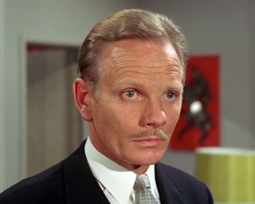
Allan Darling Cuthbertson was an Australian-born British actor. He was best known for playing stern-faced military officers in British films of the 1950s and 1960s.

Barnacle Bill is a 1957 Ealing Studios comedy film, starring Alec Guinness. He plays an unsuccessful Royal Navy officer and six of his maritime ancestors. This was the final Ealing comedy, and the last film Guinness made for Ealing Studios. His first Ealing success was in Kind Hearts and Coronets (1949), in which he also played multiple roles. The film was written by the screenwriter of Passport to Pimlico.

Sir Alexander Sprot, 1st Baronet, was a British soldier and Scottish Unionist Party politician. He served in the Second Anglo-Afghan War, the Second Boer War and World War I. During his political career, he represented the constituencies of East Fife and North Lanarkshire.
Julian Neil Rohan Wadham is an English actor of stage, film and television.

Sir Alec Guinness was an English actor. After an early career on the stage, Guinness was featured in several of the Ealing comedies, including Kind Hearts and Coronets (1949), in which he played eight different characters, The Lavender Hill Mob (1951), for which he received his first Academy Award nomination, and The Ladykillers (1955). He collaborated six times with director David Lean: Herbert Pocket in Great Expectations (1946), Fagin in Oliver Twist (1948), Col. Nicholson in The Bridge on the River Kwai (1957), for which he won both the Academy Award for Best Actor and the BAFTA Award for Best Actor, Prince Faisal in Lawrence of Arabia (1962), General Yevgraf Zhivago in Doctor Zhivago (1965), and Professor Godbole in A Passage to India (1984). In 1970, he played Jacob Marley's ghost in Ronald Neame's Scrooge. He also portrayed Obi-Wan Kenobi in George Lucas's original Star Wars trilogy; for the original 1977 film, he was nominated for Best Supporting Actor at the 50th Academy Awards.
Alec Coppel was an Australian-born screenwriter, novelist and playwright. He spent the majority of his career in London and Hollywood, specialising in light thrillers, mysteries and sex comedies. He is best known for the films Vertigo (1958), The Captain's Paradise (1953), Mr Denning Drives North (1951) and Obsession (1949), and the plays I Killed the Count and The Gazebo.
The 1945 New Year Honours were appointments by many of the Commonwealth realms of King George VI to various orders and honours to reward and highlight good works by citizens of those countries. They were announced on 1 January 1945 for the British Empire, Canada, and the Union of South Africa to celebrate the past year and mark the beginning of 1945.

Game for Three Losers is a 1965 British drama film directed by Gerry O'Hara and starring Michael Gough, Mark Eden and Toby Robins. It was made at Merton Park Studios as part of the long-running series of Edgar Wallace adaptations; this being adapted from a novel of the same name by Edgar Lustgarten.















